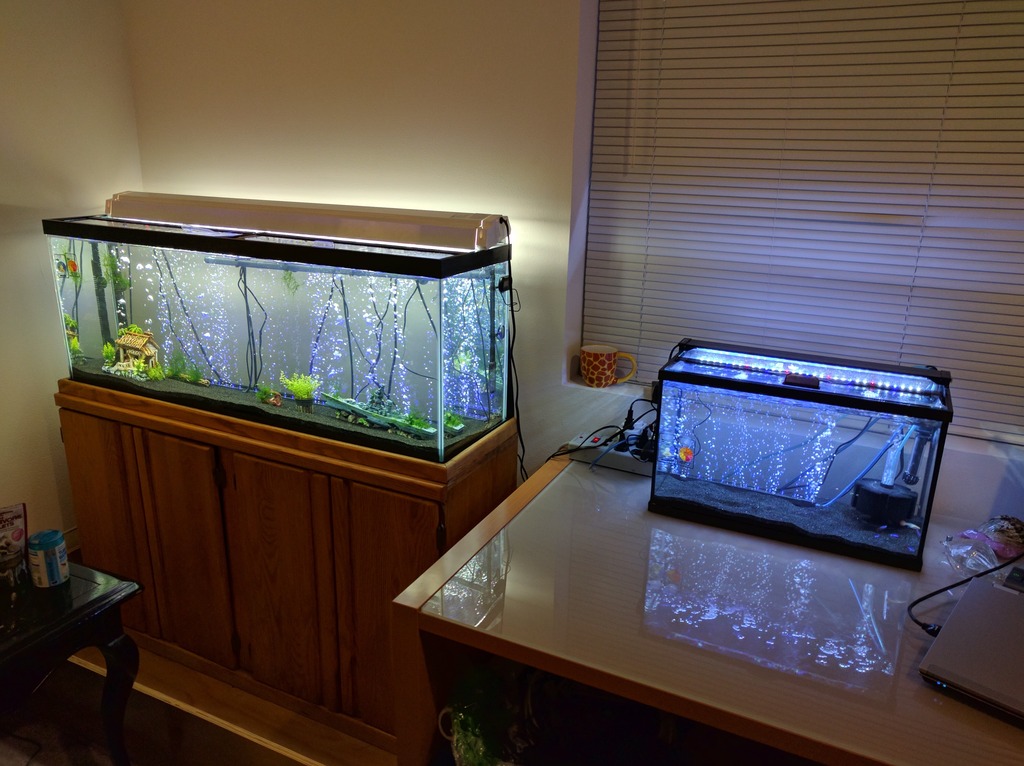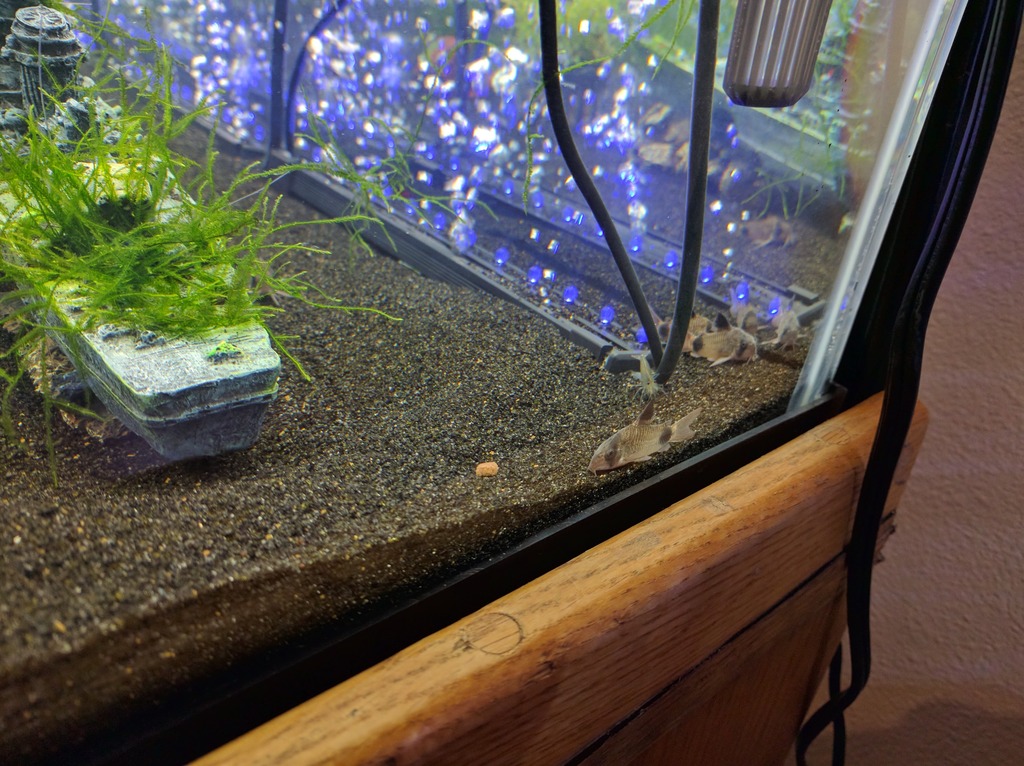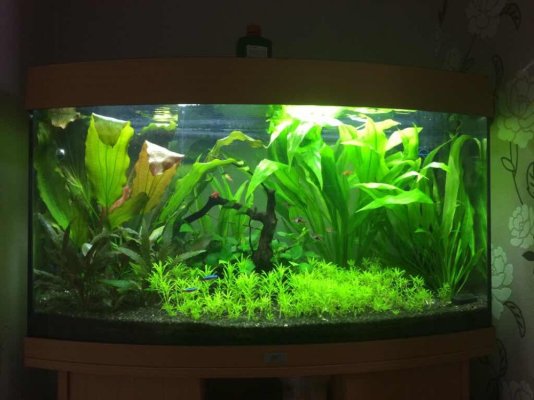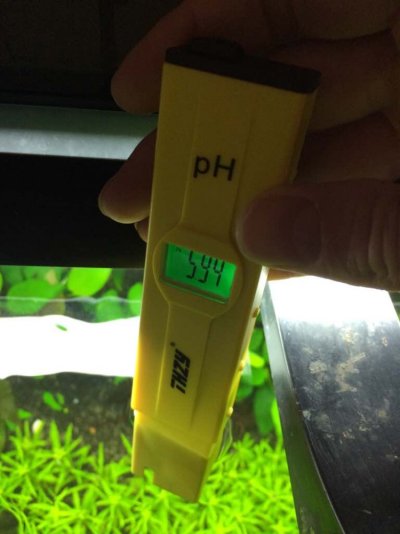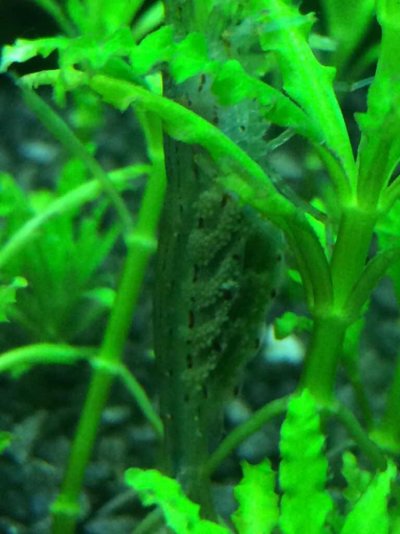Hi folks,
I had a couple of quick questions regarding Panda Cories and water conditions / environment. First, a bit of background:
I've noticed that my Pandas over the past couple of weeks have lost some color and are a bit more lethargic - I had an active parasite infestation which is currently undergoing treatment, which I assumed was the cause. However, I have not observed similar symptoms to the other fish in the tank, which led me to dig a bit deeper. Turns out the API test strips and Seachem in-tank sensor I was using were both giving me incorrectly low PH readings - the strips claimed my tank was neutral, and the seachem sensor 7.4. After getting my API liquid test kit today, I've confirmed a PH of 8.1 in the tank. Perhaps I just got profoundly unlucky with a bad sensor and a bad batch of strips at the same time? Yeah . . .
Anyway, my water params are as follow:
Tap Water:
PH: 7.6 (consistent with water utility's numbers)
Ammonia: 0
Nitrite: 0
Nitrate: 0.02 ppm
KH/GH: Unknown, but suspect 10/20ish ppm. Waiting on a liquid test kit for this.
Tank Water:
Temperature: 76F
PH: 8.1 (24hr after a 50% water change)
Ammonia: 0
Nitrite: 0
Nitrate: 2.5 ppm
KH/GH: 30/40 according to the strips. Waiting on a liquid test kit for this.
I should note that I have a sock of crushed coral in my Cascade canister filter, which is why the PH is so high. Obviously this is outside the comfort zone of the Cory Cats, and I never would have let it get this bad knowingly - this is a case of trusting my instruments a bit too much. Now that it is here, though, I'm at a bit of a loss as to how to handle it. I think I need to remove the coral sock, or at least reduce the amount of coral in it to keep the PH lower. I have a bottle of Seachem Neutral Regulator (I normally use Safe) which I could use to bring the PH down, but I'm concerned that this might bring the hardness to dangerously low levels for the Cories and precipitate all of the calcium out of my water.
Any suggestions you can offer would be greatly appreciated. I know for sure I need to reduce the coral amount, and I am thinking it may be wise to start using the Neutral Regulator for PH control, since from what I've read 7.0 is a nice number for Panda Cories. If I start using the neutral regulator, should I abandon the idea of coral in my filter?
I had a couple of quick questions regarding Panda Cories and water conditions / environment. First, a bit of background:
I've noticed that my Pandas over the past couple of weeks have lost some color and are a bit more lethargic - I had an active parasite infestation which is currently undergoing treatment, which I assumed was the cause. However, I have not observed similar symptoms to the other fish in the tank, which led me to dig a bit deeper. Turns out the API test strips and Seachem in-tank sensor I was using were both giving me incorrectly low PH readings - the strips claimed my tank was neutral, and the seachem sensor 7.4. After getting my API liquid test kit today, I've confirmed a PH of 8.1 in the tank. Perhaps I just got profoundly unlucky with a bad sensor and a bad batch of strips at the same time? Yeah . . .
Anyway, my water params are as follow:
Tap Water:
PH: 7.6 (consistent with water utility's numbers)
Ammonia: 0
Nitrite: 0
Nitrate: 0.02 ppm
KH/GH: Unknown, but suspect 10/20ish ppm. Waiting on a liquid test kit for this.
Tank Water:
Temperature: 76F
PH: 8.1 (24hr after a 50% water change)
Ammonia: 0
Nitrite: 0
Nitrate: 2.5 ppm
KH/GH: 30/40 according to the strips. Waiting on a liquid test kit for this.
I should note that I have a sock of crushed coral in my Cascade canister filter, which is why the PH is so high. Obviously this is outside the comfort zone of the Cory Cats, and I never would have let it get this bad knowingly - this is a case of trusting my instruments a bit too much. Now that it is here, though, I'm at a bit of a loss as to how to handle it. I think I need to remove the coral sock, or at least reduce the amount of coral in it to keep the PH lower. I have a bottle of Seachem Neutral Regulator (I normally use Safe) which I could use to bring the PH down, but I'm concerned that this might bring the hardness to dangerously low levels for the Cories and precipitate all of the calcium out of my water.
Any suggestions you can offer would be greatly appreciated. I know for sure I need to reduce the coral amount, and I am thinking it may be wise to start using the Neutral Regulator for PH control, since from what I've read 7.0 is a nice number for Panda Cories. If I start using the neutral regulator, should I abandon the idea of coral in my filter?
Last edited:

